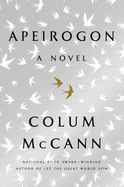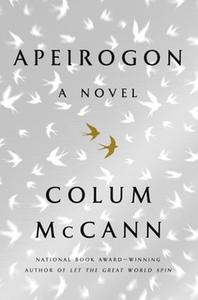
 In a 2010 e-mail conversation in The Believer with Bosnian writer Aleksandar Hemon, Colum McCann observed, "I happen to think that an ounce of empathy is worth a boatload of judgment." That's the principle animating his magnificent novel Apeirogon, an unforgettable encounter with the Israeli-Palestinian conflict from both sides of the chasm separating the antagonists, that's audacious in both substance and form.
In a 2010 e-mail conversation in The Believer with Bosnian writer Aleksandar Hemon, Colum McCann observed, "I happen to think that an ounce of empathy is worth a boatload of judgment." That's the principle animating his magnificent novel Apeirogon, an unforgettable encounter with the Israeli-Palestinian conflict from both sides of the chasm separating the antagonists, that's audacious in both substance and form.
McCann, winner of the National Book Award for his novel Let the Great World Spin, anchors Apeirogon in the true stories of Palestinian Bassam Aramin and Israeli Rami Elhanan. In 1997, Rami's 13-year-old daughter, Smadar, was one of eight victims of a terrorist bombing on Jerusalem's Ben Yehuda Street. Ten years later, Bassam's 10-year-old daughter, Abir, was killed by a rubber bullet fired by an 18-year-old Israeli border guard. Already acquainted with each other through the organization Combatants for Peace, and now linked by these twin tragedies, Bassam and Rami eventually unite as passionate advocates for a peaceful end to the conflict that, as of 2020, seems at least as far from resolution as it has ever been.
Frankly tying Apeirogon (the word describes a geometric shape with a countably infinite number of sides) to the classic One Thousand and One Nights, McCann tells their stories in an equal aggregation of numbered sections, some of them as short as a few words, others several pages in length. At the precise center of the novel, Rami and Bassam are allowed to speak in their own eloquent voices about the devastating event that set each one's life on a radically different, desperately unwanted, course.
McCann's (Thirteen Ways of Looking) daring storytelling technique must be experienced to be fully understood. He eschews any attempt at linear narrative, drawing his material from politics, history, religion, literature, art, music and myth, along with an assortment of other disciplines. Touching on a dazzling array of specific topics that include the migratory patterns of birds through the Middle East, the origin of the explosive Semtex, Philip Glass and Jorge Luis Borges, predator drones and medieval battering rams, to name but a handful, McCann trusts the reader to make connections between these superficially unrelated topics. The effect is encyclopedic, occasionally disorienting, but somehow McCann painstakingly re-creates the complexity of the conflict that has separated Rami's and Bassam's peoples for so long and spawned the violence culminating in their daughters' equally random deaths. In a sense, the novel almost demands to be reread, in the fashion of a religious text, as one seeks deeper meaning in its kaleidoscopic patterns.
"I have nothing to say that will change anybody's mind. Nothing," McCann concluded in The Believer conversation. "Being didactic is uninteresting. But allowing space for people to remake their minds about things, to change--or to get angry--is a viable literary purpose." On a subject where beliefs are often etched in stone, Apeirogon's skillful blend of fact and fiction presents readers with a distinct challenge--to think for themselves. --Harvey Freedenberg, freelance reviewer
Shelf Talker: A daring view of the Israeli-Palestinian conflict through the lens of two fathers' tragic losses.

